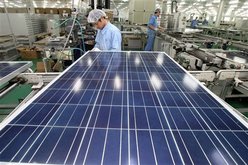China questions US anti-dumping ruling on solar power equipments
China Friday rejected a U.S. antidumping ruling against its solar power equipment with the Chinese manufacturers warning that possible higher tariffs might hurt efforts to promote clean energy.

The conflict has worsened U.S.-Chinese trade tensions and put a question mark on the pledge of both governments to cooperate in developing renewable energy.
Both the countries accuse each other of violating free-trade pledges by subsidizing their own manufacturers.
"The U.S. ruling is unfair, and the Chinese side expresses its extreme dissatisfaction," said a Commerce Ministry spokesman, Shen Danyang, in a statement.
Shen warned the ruling might harm clean energy cooperation but gave no indication how Beijing might respond.
Chinese solar equipment manufacturers have earlier warned that sanctions could result in a loss of American jobs because U.S. companies are both buyers of Chinese products and suppliers of materials. They said Chinese manufacturers spend some $2 billion a year to buy materials such as polysilicon from U.S. suppliers.
In a preliminary ruling Thursday, the US Commerce Department said the Chinese producers sold solar cells and panels at very low prices and thus were geared to hurt American producers.
Based on a study, the US Commerce Department said it had found that Chinese solar panel producers dumped exports at 31 per cent and 250 per cent below cost.
Compared with the countervailing duties ranging between 2.9 per cent to 4.73 per cent two months ago, the anti-dumping margin is stiff and will hurt Chinese manufacturers, as well as US importers. It also will limit the amount of solar panel products in the US market.
If the US commerce department ruling is upheld, on an average there could be 31 per cent hike in levy on Chinese solar-panel imports.
Three major Chinese manufacturers _ Yingli Green Energy Holdings Ltd., Suntech Power Holdings Co. and Trina Solar Ltd. _ rejected accusations that they were selling goods at improperly low prices.
Trina's chief commercial officer, Mark Kingsley said their exports to the US are unlikely to be affected if Washington raises tariffs. He said any solar cells or other parts affected by the duties can be replaced by components from other countries.
Chinese producers also warned that higher U.S. tariffs might raise the cost of solar equipment and hamper efforts to promote renewable energy.
"Tariffs are disruptive and destructive for the entire solar industry," said Yingli's chairman, Miao Liangsheng, in a statement.
In November, the US Commerce Department based on complaints by a group of U.S. producers led by Oregon-based SolarWorld Industries America Inc., a unit of Germany's SolarWorld AG, lodged investigation.
Following the bankruptcy of solar-panel maker Solyndra LLC after the California-based company received a $528 million U.S. government loan reinforced the complaint.
Solyndra cited Chinese competition as one reason behind its failure.
Beijing responded by launching its own probe last November into whether
US government support for producers of wind, solar and other renewable energy technology is an improper trade barrier.
The dispute highlights tensions over whether China's heavily regulated economy should be treated as a free market.
Beijing has pressed the United States and Europe to officially grant such status, which would make it harder to bring some dumping and other complaints.
US regulators are instead probing how much government support China is providing to its manufacturers.
Shen, the Commerce Ministry spokesman, criticized that approach and said it resulted in an unfairly high comparison price.
The Chinese officials point to the US action in 2009 when it imposed stiff tariffs on Chinese tyre imports on the grounds that it was hurting domestic jobs. Three years later, figures prove the decision foretells a half-truth at best.
According to the US International Trade Commission, the tariffs did lead to a 30 per cent cut in Chinese-made tyre imports from 2009-11, but it did not mean 30 per cent more tires were made in the US.
Instead imports from Korea, Indonesia, Thailand and Mexico surged. There has been no big boost to the job creation at all.
If the solar case was found to be a duplication of the tyre case, that would only prove the government's decision and pubic well-being are kidnapped by domestic interest groups again.
Source: US News.Net
- 475 reads
Human Rights
Fostering a More Humane World: The 28th Eurasian Economic Summi

Conscience, Hope, and Action: Keys to Global Peace and Sustainability

Ringing FOWPAL’s Peace Bell for the World:Nobel Peace Prize Laureates’ Visions and Actions

Protecting the World’s Cultural Diversity for a Sustainable Future

Puppet Show I International Friendship Day 2020

